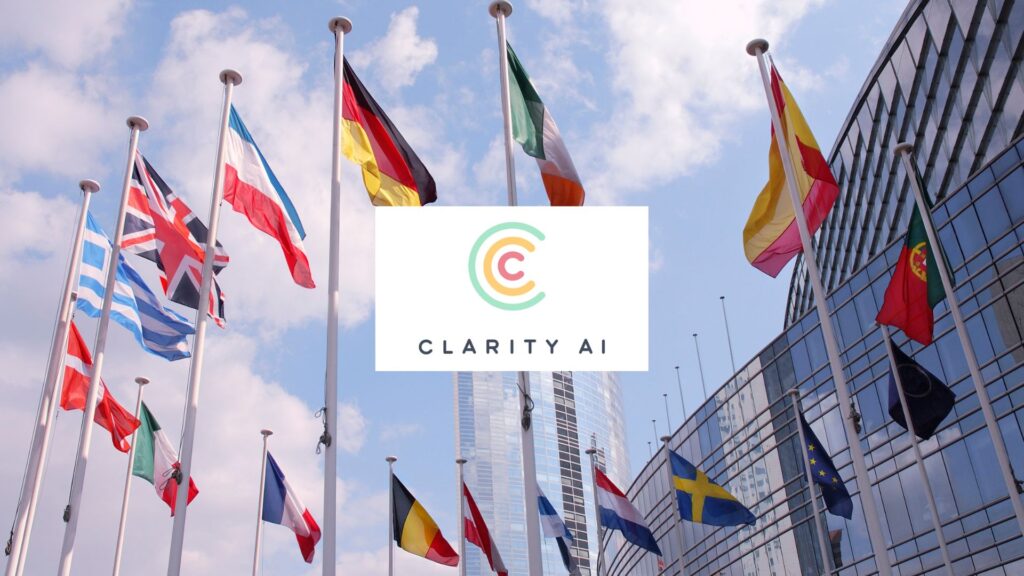Nearly Half of Eco-Named Funds May Violate New EU Regulations, Clarity AI Study Reveals

44% of these funds are invested in assets that breach the Paris-aligned benchmark (PaB) exclusionary criteria
In the first of a two-part series examining ESMA’s name rule restricting the use of ESG and sustainability-related terms in funds’ names, Clarity AI research suggests that 44% – nearly half of the funds using environmental and impact terms – may need to change their name or divest assets. In other words, the analysis shows that these funds are invested in assets that breach the Paris-aligned benchmark (PaB) exclusionary criteria¹. Of those funds with investments in breach of PaB criteria, some 82% are Article 8 funds. Asset managers will need to move fast: the guidelines were published on 14 May and will apply three months after their translation is published on ESMA’s website. Existing funds will then have six months to make the necessary adjustments.
In this first study, we analyzed funds that specifically use environmental (including broad ESG and sustainable terms) and impact terms which are subject to applying the PaB exclusionary criteria related to exposure to certain sectors or revenue streams, such as fossil fuels. We found that a large proportion of EU funds using these terms in their names may need to reevaluate the types of industries and revenue streams their products are exposed to. In the second part, to be released soon, we look into the criteria related to violations of United Nations Global Compact (UNGC) principles or the Organisation for Economic Cooperation and Development (OECD) Guidelines for Multinational Enterprises. Due to the focused approach of this initial analysis (and a set of conservative assumptions on e.g. captured terms outlined below), we believe the true figure of funds in breach of the guidelines could be even higher than 44% and will elaborate more on this in the second part of this mini-series.
Introduction, background and overview
On 14 May 2024, ESMA finalized its long-awaited guidelines on funds’ names using ESG or sustainability-related terms, commonly referred to as its fund “names rule”. The guidelines, originally consulted in November 2022, introduce requirements on funds that use ESG or sustainability-related terms in their names. Amongst other requirements, funds that use environmental and impact terms must ensure that their portfolio assets are not exposed to certain sectors via associated revenue, as stipulated by the Paris-aligned benchmark criteria. Clarity AI research shows that nearly half of funds using such environmental and impact terms may be invested in assets that breach the revenue thresholds across those exclusionary criteria.
The ESMA fund names rule applies to any EU fund using an ESG or sustainability-related term in its name. The rules vary depending on the term used, but broadly stipulate that any asset manager using a generic sustainability, environmental or impact term must ensure:
- A minimum of 80% of assets are used to meet the environmental and/or social characteristics or sustainable investment objectives of the fund.
- No exposure to assets that breach the PaB exclusions.
Paris Aligned Benchmark exclusions:
- (a) companies involved in any activities related to controversial weapons;
- (b) companies involved in the cultivation and production of tobacco;
- (c) companies that benchmark administrators find in violation of the United Nations Global Compact (UNGC) principles or the Organisation for Economic Cooperation and Development (OECD) Guidelines for Multinational Enterprises;
- (d) companies that derive 1% or more of their revenues from exploration, mining, extraction, distribution or refining of hard coal and lignite;
- (e) companies that derive 10% or more of their revenues from the exploration, extraction, distribution or refining of oil fuels;
- (f) companies that derive 50% or more of their revenues from the exploration, extraction, manufacturing or distribution of gaseous fuels;
- (g) companies that derive 50% or more of their revenues from electricity generation with a GHG intensity of more than 100 g CO2 e/kWh.
The first of this two part series will examine (a), (b), (d), (e), (f), and (g). The second article will cover (c).
In the first analysis of this 2-part series, we examine the Paris-aligned benchmark exclusionary criteria related to exposures to controversial weapons, tobacco, fossil fuels, and companies whose revenue comes from intense energy generation. To apply these exclusionary criteria thoroughly, it is important that asset managers understand the companies, industries and revenue streams they are exposed to. The analysis covers fully criteria (a), (b), (d), (e), (f) and (g):
- (a) companies involved in any activities related to controversial weapons;
- (b) companies involved in the cultivation and production of tobacco;
- (d) companies that derive 1% or more of their revenues from exploration, mining, extraction, distribution or refining of hard coal and lignite;
- (e) companies that derive 10% or more of their revenues from the exploration, extraction, distribution or refining of oil fuels;
- (f) companies that derive 50% or more of their revenues from the exploration, extraction, manufacturing or distribution of gaseous fuels;
- (g) companies that derive 50% or more of their revenues from electricity generation with a GHG intensity of more than 100 g CO2 e/kWh.
In Part 2, we will examine criteria (c), concerning companies in violation of the United Nations Global Compact (UNGC) principles or the Organisation for Economic Cooperation and Development (OECD) Guidelines for Multinational Enterprises.
Our expectation is that the 44% of funds potentially in breach of the PaB exclusions based on this first analysis will only increase when adding the additional criteria.
Related Article: EU Implements Landmark Product Sustainability Regulations, Bans Destruction of Unsold Apparel
Research
ESMA only provided a partial list of captured terms as part of its consultation or final rule. Clarity AI therefore supplemented this list by undertaking a reverse lookup of EU funds in its universe containing terms that could be potentially captured. We considered only the top 25 most frequently used terms along with any explicitly mentioned by ESMA, before removing any social, governance and transition related terms. We took a narrow view of which terms could be considered environmental-related, to ensure our estimates remained conservative. We exclusively used English language terms in our sample, which covers the majority of funds in the EU.












